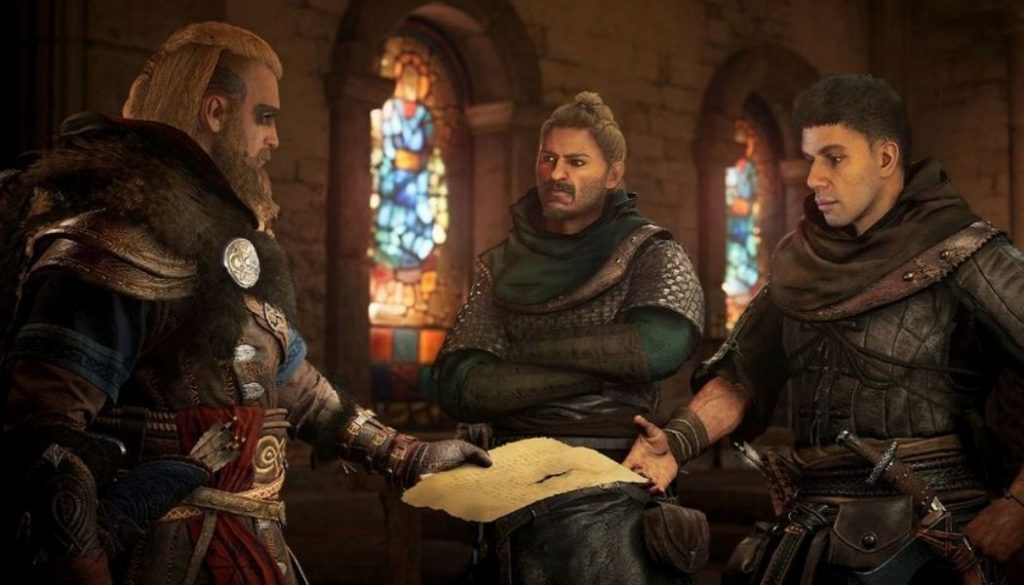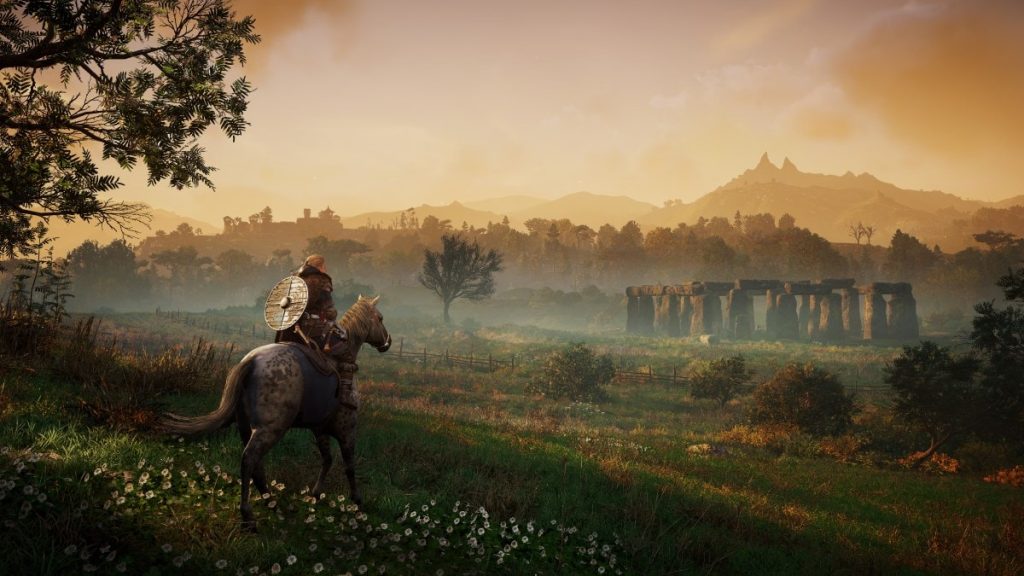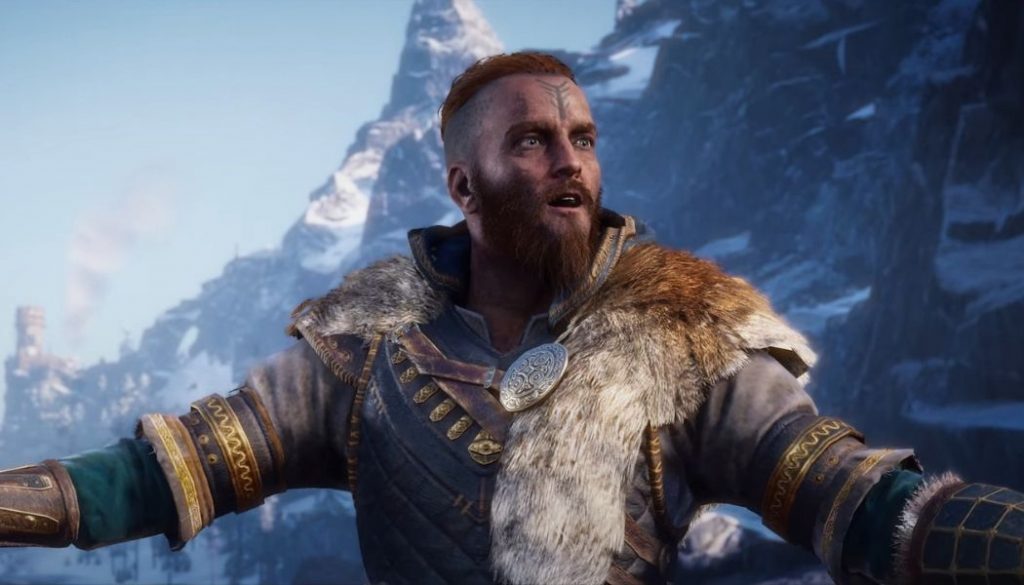Voyage with Vikings to England in a video game
Venture to the primeval forests and rolling hills of early Medieval Britain and explore the snow-capped landscapes of Norway while enjoying one of the most cinematic experiences Ubisoft has to offer. Like Origins and Odyssey before it, Assassin’s Creed Valhalla is a story-based, open-world RPG. Here’s why Valhalla is a great game for travelers interested in the history of ninth-century England and Norway.
The game is beautifully rendered, a stunning open-world experience. If you are intrigued by Viking lore and want to learn more about their culture and history, Assassin’s Creed Valhalla is the game for you. It makes for a gaming experience that feels like you’re participating in a Viking saga.
In the prologue of the game, the voice of a seer recites the Norse creation myth. In the void, fire and ice merged and Ymir, a giant hermaphrodite came into being. After his death and dismemberment, the land was created from his flesh, the ocean from his blood and the mountains from his bones.
You then take on the role of Eivor, a Norse warrior who grows up seeking revenge after the massacre of his village by a Viking warlord in the opening cinematic. Many years later, Harold Fairhair, another Viking warrior, seeks to unify Norway and become its first king.
In Norway you can watch the mystical glow of the Northern Lights as you navigate the snowy mountain terrain, horse-back ride along rocky, snow-capped mountains, sail on the North Sea, and explore Viking villages. You’ll also see interesting stone structures, green fields and beautiful fjords and glaciers.
The title of the video game is taken from Valhöll, meaning ‘hall of the slain’ in Old Norse. Valhalla is a massive afterlife hall ruled by Odin, the chief of the gods. Half of those killed in battle will travel to Valhalla after death, led by valkyries, the helping spirits of Odin. There they will spend the day fighting each other in valorous combat, have their wounds healed by evening and then sit at feasting tables, eating wild boar and drinking mead, while being waited on by beautiful maidens. The other half of those who die in battle will go to another heroic paradise, Fólkvangr, the field of the war-goddess Freyja, a beautiful meadow with a hall where there is also much fighting, feasting and drinking.
War and overcrowding in Norway force Eivor’s clan to leave and settle in Anglo-Saxon England as part of the Viking expansion into Europe. This sets the stage for your arrival in England where you’ll forge alliances with other Viking clans and a Saxon king to maintain and grow your settlement. You’ll also be dealing with the chaos and warfare spreading across England’s four kingdoms: East Anglia, Mercia, Northumbria, and Wessex.
Your clan moves to Ravensthorpe, an abandoned riverside settlement in the south of Leicestershire that contains a longhouse and some shacks and tents. Once you make it to England, the map allows you to travel back to Norway whenever you want. Your settlement encourages you to get to know your Viking clan. You are invested in their livelihood, helping them solve their problems and settle disputes. Random side missions for strangers have been replaced with doing tasks for people in your homestead—tasks like finding Roman artefacts for the museum owner or helping your blacksmith find a wife. You’ll get to know the non-player characters on your settlement throughout the game, and their stories will slowly weave together to tell the larger story of your clan.
Your settlement is highly customizable. You can construct and upgrade structures like tattoo parlors, stables, trading posts, barracks and blacksmith shops. Valhalla allows you to be creative in building out your settlement. You can enjoy Viking feasts in the longhouse. In the trading post you can craft hunting trophies and trade pelts. If you build a barracks you can recruit a Jomsviking, a member of an elite order of Viking mercenaries. In the barracks there is even an Orlog table with carved tokens and dice. Orlog is a traditional Viking dice game, a minigame played with six-sided dice. You can build a fishing hut where caught fish are stored, a cartographer’s hut that provides regional maps and a seer’s hut decorated with strings of bones and beads.
Valka is the seer of your clan. In her hut she concocts a hallucinatory potion that gives you visions of mythical universes, including Asgard, the dwelling place of a tribe of gods from the Norse pantheon, and Jötunheimr, the land of forests and mountain peaks inhabited by frost giants. Odin will come to you in visions to pass on important information during your epic journey.
Take your gaming experience further by meeting important historical figures featured in Assassin’s Creed Valhalla. Encounter people like Alfred the Great, King of Wessex, and the future King of Anglo-Saxon England, along with Guthrum, the Danish Viking who made a treaty with Alfred the Great and became the king of East Anglia.

You’ll also encounter Ivar the Boneless and Ubba Ragnarsson who led the Great Heathen Army, a coalition of Vikings from Denmark, Norway and Sweden. They invaded England to avenge the death of their father Ragnar Lodbrok, the legendary Viking who was captured by the king of Northumbria and thrown into a pit of snakes. With Ivar the Boneless you will conquer East Anglia and install puppet kings. With Halfdan Ragnarsson you will head north and wage war on the Picts, a Celtic-speaking people who lived in northern and eastern Scotland.
Since this is an open-world experience, you can explore 9th century England by foot, horseback, and longboat. You can even customise your warship. The graceful wooden longboats with their shallow-draft hulls are perfect for sailing the riverways and for beach landings to raid settlements. Throughout your sailing, you can turn on the cinematic ship camera to get a panoramic view of the landscape. This lets you admire the surroundings and take beautiful screenshots.
As for action, there’s plenty of that too—especially axe combat. You can go on raiding expeditions, ransack settlements, participate in castle sieges, pillage abbeys and loot church relics from monasteries. You can accompany a skald and protect him from bandits. Skalds were the poets and storytellers who composed and recited the feats of kings and chieftains in feasting halls and throne rooms. The poetry of skalds preserved the oral history of the clan.
You can spend hours just wandering around and enjoying the cinematic experience, hunting elk, exploring Roman ruins, playing drinking games to see who can down horns of mead the fastest and stay standing. You can also participate in flyting, a kind of Viking rap battle. In these verbal contests the two parties exchange insults in a poetic and provocative way. Flyting was common between the 5th and 16th centuries and was prevalent in Norse, Celtic, Old and Middle English literature.
Players will find that many of the places in Valhalla are based on locations you can visit in the real world. The game has a stunning recreation of the White Cliffs of Dover and a panoramic view that shows the beauty and mystery of Stonehenge.

You can also visit 9th-century English cities like London, York, and Winchester, so it’s a great way to go back in time and experience this period in history.
The original score of the game includes music that blends Celtic and Scandinavian instruments. The tracks use the tagelharpa, a Scandinavian lyre and the carnyx, a Celtic wind instrument from Scotland. The composers drew inspiration from Norse folk music and used various instruments including metallic drums, harps and Viking horns. Vocals for the music include Norse lyrics taken from a runic inscription and an excerpt of a medieval skaldic poem.
The Ubisoft team put a lot of effort into creating an interactive, open-world experience. You will learn plenty about Norse culture by participating in a historical drama that may someday be set down in prose by Viking saga-writers.
